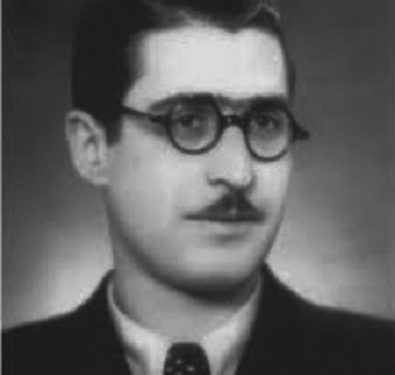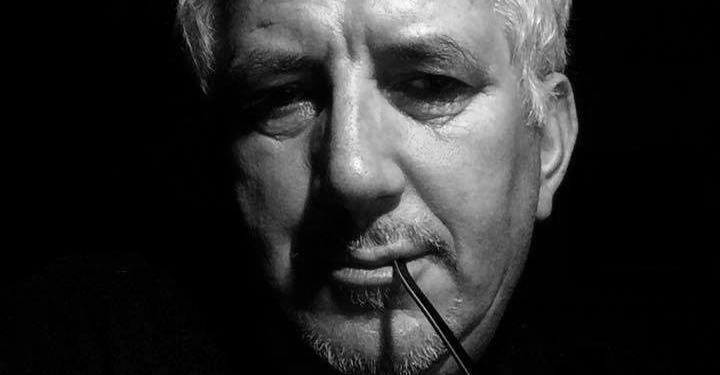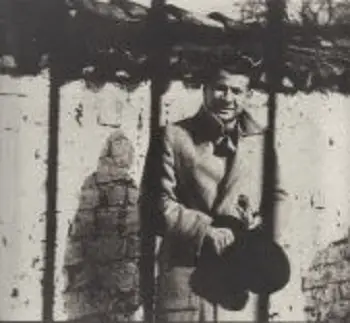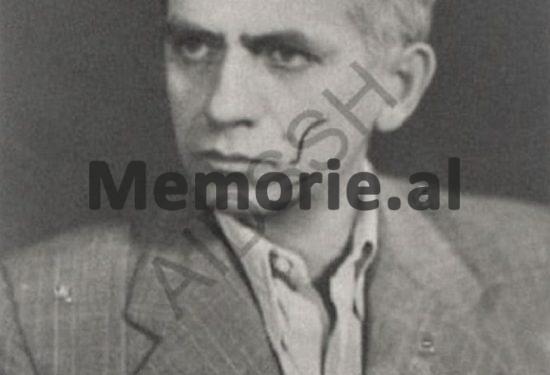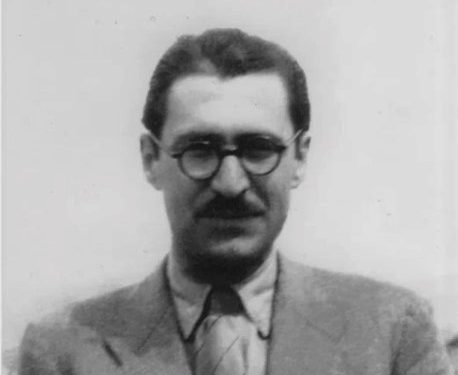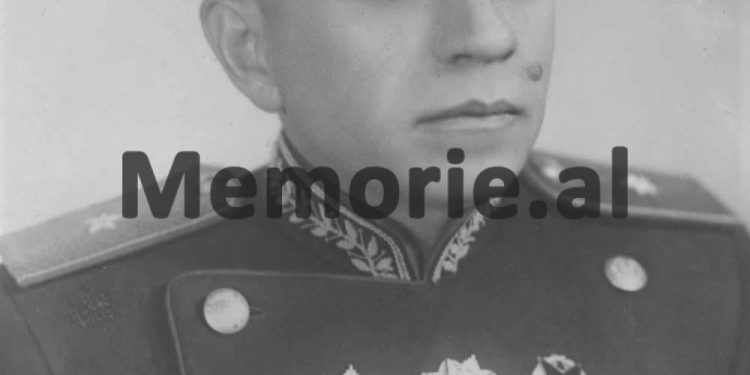By Jozef Radi
-How did I become friends with Mit’hat Araniti?! –
Jozef Radi asks Mit’hat Araniti (1992)
Memorie.al / Mit’hat Araniti and Lazër Radi, have shared time, life and common destinies…! Before the War, and during the War; after the War and during the dictatorship (the never-ending class war). Together in prisons, in internment camps, under the strict surveillance of the State Security, always in the fight to survive, but also to protect those intellectual and human values, that that generation of idealists, had not only dreamed of, but also fought with spirit for: A Different Albania…!! Both had common prisons, common camps, both had their wives in common prisons, both gave birth to their children late, because they were in common prisons and, inhumane camps.
They worked together, and never gave up, they supported each other in numerous sacrifices, even when the regime separated them, even a word, a smile, or even a joke, said in passing, was enough to deeply understand each other…! Only after ’90, finally they; (Mit’hat and Lazri) had the opportunity to meet, as they once did in their early youth: so free… and to speak openly with each other… and to continue in conversations, thoughts and memories that had begun since time immemorial…! Now they also had within themselves that great pain, that age did not promise much, neither for one nor the other…!!
Mit’hat, was a rare man…!
With a smile he seemed to be carved, under the legendary mustache, with an elegant humor, with ready and refined jokes, and a boundless culture…! A simple argument was enough and you could talk to him, endlessly… turning hours into minutes…! Even though he was almost 80 years old, his soul remained youthful, full of light, full of desire, even though illness, suffering, troubles and age had worn him down…!
I managed to get this short interview, which remains one of the rare ones, with great difficulty. Not because he didn’t want to, but because his health quickly deteriorated. After many conversations and visits, it was done, and I promised to include it in the publications of “Arbërija”, but I couldn’t…! After three issues, it couldn’t continue any further…! But I published five of his poems, adding a little bit of his eternal, noble smile…!
In 1996, this interview was found and included in a collection of his writings, published in the pre-liberation press, under the title; “False Qyfyre të Rrem Voglit, katunar pri Rrashbulle…”! – Phoenix. This exclusive interview is published for the first time! Whoever reads it, understands that it is simply the testimony of a nationalist nobleman, one of those who rarely come to this ungrateful country… and leave in silence, unrewarded:
Endless honors for Mit’hat Araniti…!
Jozef Radi, July 13, 2013
“…I was simply a soldier of Nationalism, for the freedom of Albania…!”
Who is Mit’hat Araniti, from this height of age where you are?
Mit’hat Araniti: As I emphasized above, I was a simple member of the Nationalist movement, for the freedom of Albania. The age of 80, makes me realize with pleasure, that after so many years, this movement is gaining more and more color…!
A large part of the characters who have been in the whirlpools of historical events, have died and have taken their truths with them; another part, although they are alive, have written history according to their box, so it is not up to them to rewrite history…! Do you think that in your life there is something that not only history needs, but also us, that generation that knows so little about the true history of Albania…?
Mit’hat Araniti: History is the totality of the events and deeds of the past of a country, more or less vast. All members of a community participate in the formation of history, sometimes with actions, sometimes with words and sometimes with expressions, but none of them individually determines history itself, as a whole…! The question does not arise whether someone has written or not, a historical truth. All those who have participated in writing, in the formation of history, have written while being themselves in the vortex of the development of events, so they have viewed and evaluated those events, with the spirit of an inevitable subjectivism…! To the question you ask me, I can answer that: I was only a simple soldier of this development! Only after a relatively long time has passed, after subjective views and feelings have disappeared and faded, can an objective characterization be achieved, and the development of events be evaluated as history…!
During the 1930s, you were the initiator of dialect literature, mainly under the pseudonym Rrem Vogli, but also others…! What can you tell us about this spirit and who were its followers?
Mit’hat Araniti: Whether or not I was the initiator of dialect literature is an assessment that is not for me to make. Driven by the need to avoid censorship by the authorities, at the beginning of 1932, I began to write some satirical sketches in the Tirana dialect, attacking as much as I could various negative aspects of the society of that time. For this purpose, I used in the magazines “Illyria” and “Bota e Re”, the pseudonym “Rrem Vogli”, and later in the column; “Shkel e shko”, the pseudonyms, “Jago Blini”, “Hë De”, “Ja që hë”, “Sufi Asmon Sufes”, etc. In the Tirana dialect, Ibrahim Hasnaj (“Cen Qytyku”), Mustafa Greblleshi (“Liu Cakut”), Xhemal Farka (“Sula i Fajes”), and in the Gjirokastra dialect, Musine Kokalari (“Muza”) also wrote.
The effect of these writings was noticeable at that time. For the most part, they were positively evaluated, especially by the progressive and democratic element, as a scourge of the ignorance of the society of that time, while the circles of the mehmur, were evaluated simply as humorous performances. To emphasize the positive side of these writings, I would like to mention a small episode, which happened with the intellectual Rauf Fico: In the magazine “Illyria” my writing was published; “M’bonjat m’Nurrës”, in which the peasant Merjeme, dressed in a bathing suit, and with the new name “Meri”, tries to throw herself at the peasant Rrem Vogli, selling herself to him as a heavy lady. The lie does nothing but: “I told the donkey to go…”! “Go,” was the word that had made the most impression on Mr. Rauf, and which was the most appropriate expression to give the quality of my entire writing…!
What did the nationalist movement of intellectuals represent for you during the occupation and what does it represent today…? Can nationalism find a natural bed, in the fight for democracy?
Mit’hat Araniti: The Nationalist Movement of Intellectuals has been for me, throughout the occupation, the base, the ground, on which to work, for the liberation of the Homeland…! It represents even today, a natural bed of the fight for democracy, in the conditions of today’s Europe…!
Considering that the cream of the intellectuals adhered to the “Ballin Kombëtar”, do you think that a new generation can come, to represent your national ideal with dignity?
Mit’hat Araniti: It is already known that in the past the cream of the intellectuals joined the “Ballin Kombëtar”, but this membership was conditioned by the circumstances of a total occupation, while today the younger generation, with nationalist sentiments, finds itself involved in a pluralistic system of democracy, with differentiated goals…!
Your participation in Mukje always remains an open chapter for the truth…! Don’t you think that the division that began in Mukje continues to this day?
Mit’hat Araniti: My participation in Mukje was motivated by the goal of a nationwide unification. The division that began in Mukje does not exist today, but only a few threads of inheritance, conscious or silent, continue…!
What was your position when the war against the occupier turned into a civil war?
Mit’hat Araniti: Being in the nationalist ranks during the liberation war, we tried to form a bridge between the nationalists and the communists…! When the liberation war turned into a civil war, consistent with my thoughts, I remained and am against fratricide…!
Do you think that the communists will one day benefit not only from the “academicism” of the ‘National Front’, but also from that spirit of dissent that you had with Zog’s Legality?
Mit’hat Araniti: The communists knew, and were lucky enough to benefit precisely from the patriotic feelings of the nationalists, also related to avoiding any possible harm to the Albanian people…!
After the war, did you think about the punishment… and did you feel guilty when you were sentenced?
Mit’hat Araniti: I never thought that I could be punished after the war, because I did not think that a person could be punished and called guilty, precisely, for acting in the best interests of his homeland…!!
In what relations was the dictatorship established with intellectuals? In what relations were you with the dictatorship, considering that you were not only an intellectual and writer, but also a fairly good connoisseur of many foreign languages?
Mit’hat Araniti: In the beginning, the communists used intellectuals, according to their needs and utilitarian interests…! Later, the blade of the dictatorship (class war) was directed mainly against tens and hundreds of intellectuals, genuine ones. In order to be closed all doors, of any manifestation of their feelings and abilities. Even the knowledge of several foreign languages, for them did not constitute any special importance, neither my law degree, nor my ability to contribute to the field of letters. The dictatorship had as its main goal: the exploitation and destruction of the human personality…!
Of the people with whom you have lived and known, who would be, according to you, the personification of the true Albanian and patriot?
Mit’hat Araniti: Of the people with whom I have lived and had a very high respect, and whom I considered as the personification of the true Albanian and patriot, there are many…! There are also those among them who could not be realized in the dictatorship, but who were also destroyed by it…! I cannot forget in particular; Mirash Ivanaj, Kol Tromara, Selman Riza, Suat Asllani, and many others…
For what thing in your life have you suffered the most?
Mit’hat Araniti: The thing that has made me feel the most sorry, in my entire life, is the breakdown of the Mukje Agreement. If that Agreement had been realized, Albania today would have a completely different appearance.
Having a wife from one of the most renowned intellectual families, do you think you shared a common fate, in a common misfortune?
Mit’hat Araniti: The fact that I had as a life partner: Agime Pipa, a woman endowed with outstanding qualities, has undoubtedly been a great support for me… in facing all the difficulties of that life full of suffering and in overcoming them with dignity…!
As a lawyer, would you find any reason to defend communism, if asked to do so??
Mit’hat Araniti: As for communism, it has nothing left to defend, because it is condemned by history to extinction, even by its former followers…!
At the 1972 Orthography Congress, the Southern dialect was finally and arbitrarily decided…! Along with human violations, the Albanian language was also violated…! What do you think; could a golden mean be found?
Mit’hat Araniti: I have always been of the opinion that a language is not formed by decisions, but by means of a natural evolution, that is, it is its use, by different writers, who naturally justify it, by imposing one grammatical form or another, the acceptance of one word or another, regardless of the dialect to which they belong…!
Today the struggle for power is much bigger than the struggle for Albania, and time is proving that intellectuals are once again the first victims, even of democracy…! Do you think that such a manifestation shows that we are in post-communism?
Mit’hat Araniti: It is self-evident! When there is a struggle for power, even after the overthrow of a dictatorship, the first victims will again be intellectuals, because they are precisely those who most clearly express their thoughts on the defense of democracy, but this does not mean at all that we are entering post-communism…!
Do you think that a nationwide assembly, where all intellectual forces, inside and outside Albania, would participate, would be a historic chance for its salvation?
Mit’hat Araniti: I am fully convinced that a nationwide assembly, where all intellectual forces, inside and outside the country, participate, could be a chance for its quick salvation: but practically such a thing would be very difficult…!
You have constantly mentioned the act of Bedri Spahiu, his forgiveness and transformation. Do you really think that something like this happened to him? Do you think that a formal apology by the people of crime constitutes a noble act?
Mit’hat Araniti: To tell the truth, the act of Bedri Spahiu, with which he asks for public forgiveness for that entire he has done, has left a great impression on me. Despite the grave gravity of the crimes he admitted to and despite the suspicion that the act in question may have been merely formal, I personally believe that he still has a bit of manhood left and there is always room to formulate the hypothesis that such a gesture, if all those “pezzi grossi” had done it or were to do it, with chests full of medals and high positions, would have brought a very positive service to the Homeland.
If you were to start your life over again, who would you dedicates yourself to with all your heart?
Mit’hat Araniti: If I were to start my life over again, I would undoubtedly dedicate myself with all my heart to Albania… and the path I followed would be much clearer and safer, because I would have learned a lot from the defeats I suffered…! Memorie.al




